
Do you want to be an Amazon FBA international seller?
Sell in the USA market and others?
Today, we dive deep, so listen up and enjoy our mini Asia to Amazon mini course 🙂
People all over the world prefer to shop in the most convenient way. Gone are the days of dragging yourself to the mall to purchase something, as are the days vendors had to hand out flyers or leaflets to market products.
Can you still even sell products without the internet?
Related: Check our full Amazon FBA library for more guides and tools.
How To Start Selling On Amazon
Today we will discuss a few points: the fact that you can sell globally on Amazon with a few clicks, and that you (and your company) can be almost anywhere in the world.
What are the benefits of being in a different country when selling on Amazon?
Let’s dig in.
The internet has made everything easier. With social media, ads and whatnot, marketing and selling have become a lot easier. Selling a product online allows you to reach a wider audience and new customers, and as a buyer, shopping online is basically like having a big shopping mall right at your fingertips – one click and you have access to the whole world. Truly, the internet has changed the way people buy and sell things by removing traditional geographic boundaries.
Effortless Selling on Amazon.com

One of the world’s largest online retailers is Amazon.com. Over the years, it has expanded to sell a wide variety of consumer goods, from books to everything you could think of. Amazon isn’t just a powerful tool when it comes to buying stuff, it’s a great place to sell them as well. Amazon has over 300 million users (source) which gives sellers a massive number of potential customers. The site has comprehensive reach, categorizes just about everything and anything you could possibly want to sell, and has millions of users who frequently sort through all of those categories. Beyond a doubt, the website is basically a haven for sellers. It certainly takes business to a whole new level by putting your products in the spotlight effortlessly.
As of today, Amazon has 11 marketplaces: the US, Canada, Mexico, the UK, Germany, France, Italy, Spain, China, Japan and India. They have 120+ fulfilment centers, 180+ countries with loyal Amazon customers, and 30+ product categories (source). This allows you to grow your business internationally. Introducing your products globally takes your business to a whole new level.
Check Out The Amazon FBA Infographic!
Prefer to check out images? We made a full infographic of this blog post for you to download and enjoy! Check it out now
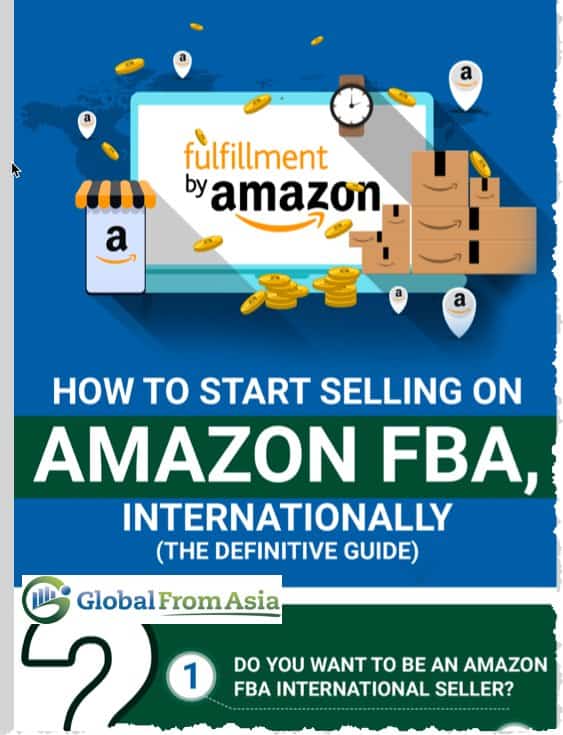
Why Sell Internationally?
The internet has made it easy to sell globally. It’s just one click and you have access to the world, so why not take advantage of it? If the business is doing well locally, why not step out of your comfort zone and introduce your products to the world. Test the waters. After all, it wouldn’t cost you that much and this could hardly put your business at risk. However, you’ll need extra time and extensive research to pinpoint which country/region you want to sell your products to. There are a few things to consider like the culture, the market, the law (restrictions, taxes and duties), the language, etc.
How Does Signing Up Work?

First things first, you need to decide on which marketplace you want to sell your products. When deciding to sell on Amazon, the best advice is to know your business and know what you’re getting into.
By focusing on your business’ information needs and strategies, you’ll be taking your business success to the next level in no time. You need to know which products are appropriate to sell, which products are profitable, and which products are unsuitable for your marketplace (e.g., Japan: goods that may violate the Law Concerning Wildlife Protection and Hunting). In addition, you need to consider the language this marketplace uses. Language proficiency is essential in order to provide good customer support – unless you use the FBA (Fulfillment by Amazon).
What is Amazon FBA?
FBA is basically sending your products directly to Amazon’s fulfilment centers where their warehouse would handle shipping, packing and customer service/support for your products. All you need to do is send your products/inventory to Amazon and let them manage the rest. This sort of program allows you to focus on other aspects of running your business (like marketing & advertising) while Amazon handles logistics, packing and customer service.
FBA is ideal for anyone who owns a small business because it could save a lot of time and money. Easy, right? However, this program is not free; you will have to pay for the fulfilment fees (per unit) and monthly inventory storage (per cubic foot). Please refer to this link for the fees.
If you’ve opted for FBA, Amazon will give you the details and shipping address of where to send your inventory and then you can sit back, enjoy a cup of joe, and wait for sales to come in (with a lot of extra effort on marketing, of course).
What Is Amazon Global Selling?

Amazon Global Selling is a program that helps you expand your business internationally by giving you access to Amazon’s 11 marketplaces and millions of customers. Basically, it means selling in more than one Amazon marketplace.
How to Get Started
1. Know your products – Which products can be globally profitable?
2. Choose your marketplaces – Do a little research on each marketplace and identify where it is best to sell your products.
3. Create an account – Sign up and go global. If you’re already registered as a seller on Amazon.com and want to expand your business in Europe, then you need to sign up again on Amazon.co.uk or whichever marketplace you want to sell.
4. FBA/Individual fulfilment – I’d choose FBA if we’re going global so we wouldn’t have trouble with language barriers/customer service, packing and shipping.
5. Start selling
This is another form of Cross-Border
E-commerce
What is cross-border e-commerce? Many say it started when eBay entered the Chinese market and started to attract Chinese businesses to sell on eBay’s US marketplace. Some say it is selling into Mainland China from outside of China, and yes, this is PART of cross-border e-commerce – but not 100% of it.
We define cross-border summit as “international e-commerce” and the process of selling a product “across borders” from one country to another. It has been happening for years, but only recently have governments and border protections gotten so “hot” that the trend for cross-border e-commerce has grown so much.
Related post – How to get started with Chinese-based cross-border e-commerce
This Discussion on Video
Watch this video with our co-host, Lyka, as she explains to you what Amazon is and how you can start selling on this e-commerce platform:
Amazon’s Registration Process
Once you’ve decided which marketplace is best for your products, you may now go through the registration process, which is fairly straightforward and can be completed in under an hour.
You can set up an Amazon Seller Central account by visiting this page.
See below screenshots to get you started.
First off, Amazon will ask you the basics: name, email and your desired password. Afterwhich, you will go through five stages: Seller Agreement, Seller Information, Billing/Deposit, Tax Information and Product information.
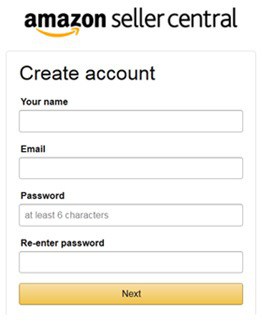
1. Seller Agreement
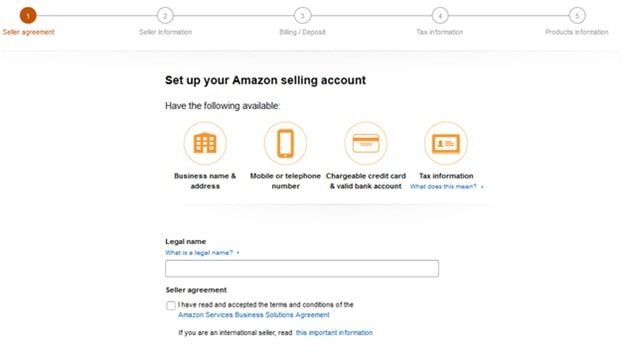
To expedite the process, you may want to prepare this information in advance:
Source: Amazon.co.uk
2. Seller Information
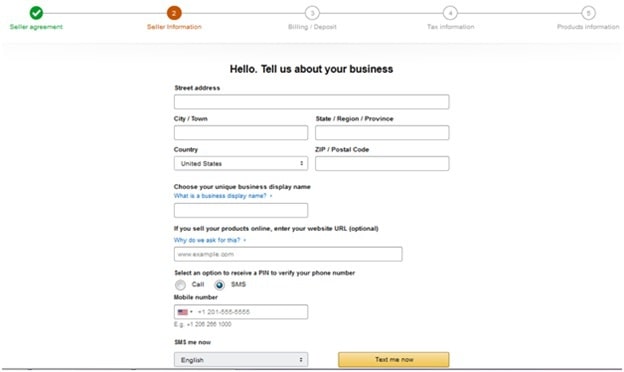
3. Billing/Deposit
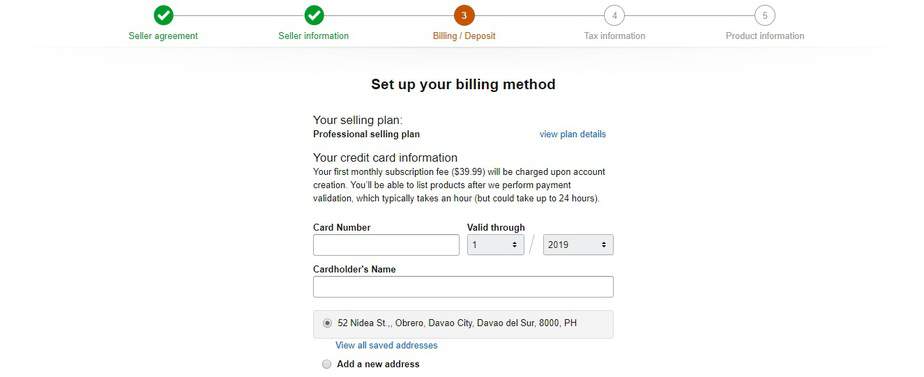
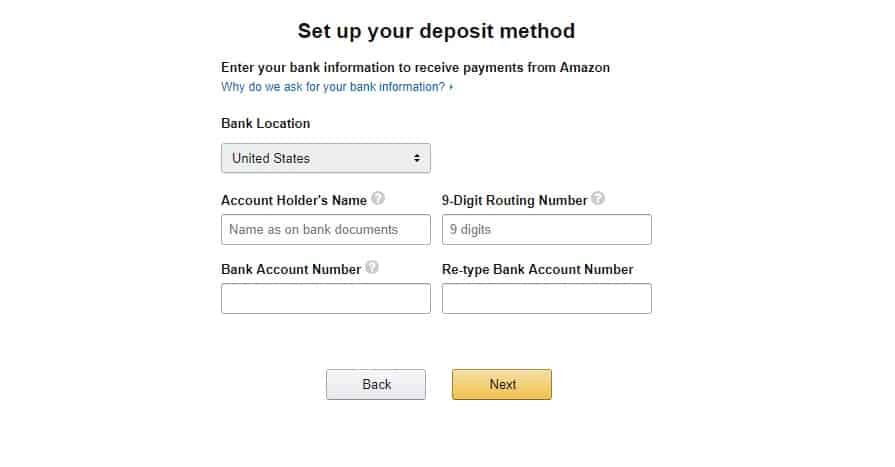
4. Tax Information

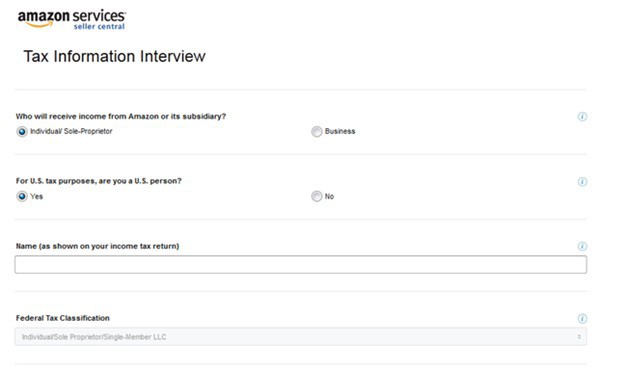
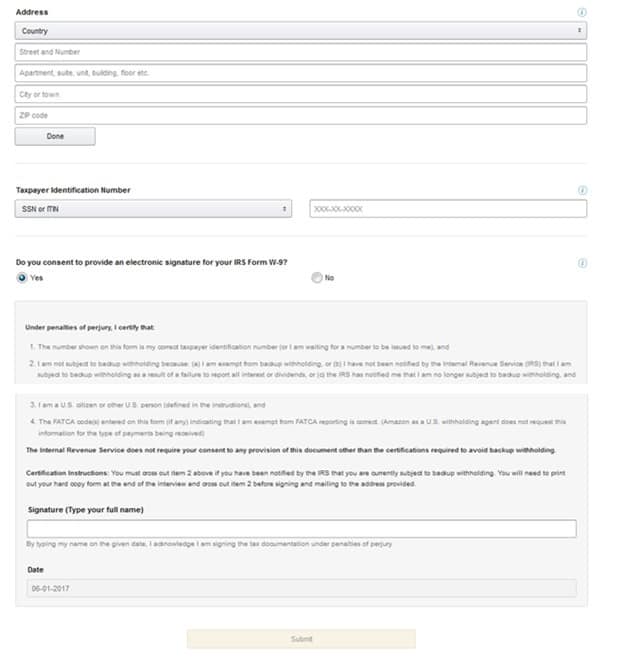
5. Product Information
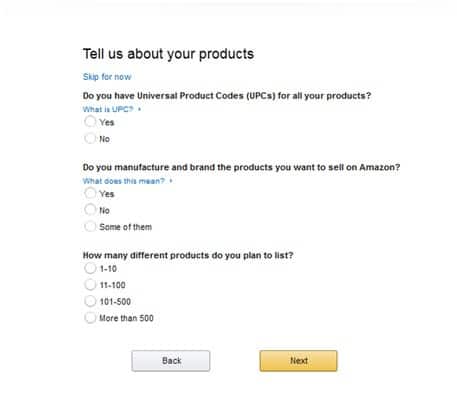
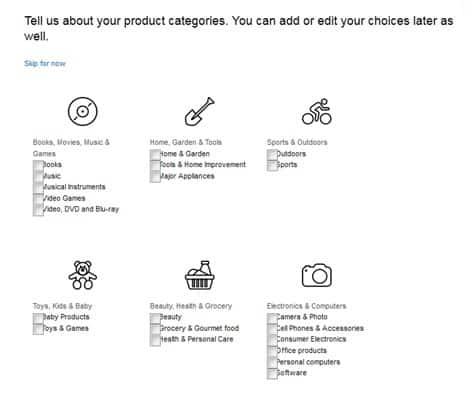
Do You Need to Have a Company in the US to Sell on Amazon US?
You can sell on Amazon US from anywhere in the world. It doesn’t require you to have a US-based company. However, Amazon will require you to have US bank account information – this is where Amazon will send the money. So for international sellers, fret not, because Amazon has a feature called Currency Converter for Sellers – this allows Amazon to send the money to your local bank in your local currency. You can check the FAQs about this feature here and list of countries and currencies supported by Amazon here.
From Which Countries Can I Open a Seller Central Account?
As of today, there are 102 countries that can access and sell on Amazon. Wherever you are in the world, you have access to Amazon’s millions of customers. Check below for countries supported by Amazon:
Albania, Estonia, Namibia, Algeria, Finland, Nepal, Angola, France, Netherlands, Argentina, Gabon, New Zealand, Armenia, Georgia, Niger, Australia, Germany, Norway, Austria, Greece, Oman, Azerbaijan, Guinea, Panama, Bangladesh, Haiti, Paraguay, Belarus, Honduras, Peru, Belgium, Hong Kong, Philippines, Benin, Hungary, Poland, Bolivia, Iceland, Portugal, Botswana, India, Russia, Brazil, Indonesia, Senegal, Brunei, Ireland, Serbia, Bulgaria, Israel, Singapore, Burkina Faso, Italy, Slovakia, Cambodia, Ivory Coast, Slovenia, Cameroon, Japan, South Korea, Canada, Jordan, Spain, Chad, Kenya, Sri Lanka, Chile, Latvia, Sweden, China, Liechtenstein, Switzerland, Colombia, Lithuania, Taiwan, Costa, Rica, Luxembourg, Thailand, Croatia, Macedonia, Togo, Cyprus, Madagascar, Trinidad & Tobago, Czech Republic, Malaysia, Turkey, Denmark, Mali, Uganda, Dominican, Republic, Mauritius, Ukraine, Egypt, Mexico, United Kingdom, El Salvador, Morocco, United States, Equatorial Guinea, Mozambique, & Vietnam (source)
Can I Sell on Amazon As a Non-US Resident?
Definitely yes.
Many Choose Hong Kong as a Base For their Amazon Seller Central Account. If you’re interested in selling on Amazon from Hong Kong, we also have a blog post talking about why many say Hong Kong is right for their FBA business headquarters
Cross-Border Payments and FX Fees
Please keep in mind cross-border payments and FX fees. By selling on Amazon, they will pay you in the currency of the country in which your seller central account is based. Many don’t even look at other alternatives and have Amazon give sellers a horrendous exchange rate.
Don’t make that same mistake!
Check out our complete guide and comparison on cross border payments for payment provider solutions and to understand the process in more detail.
Professional Seller vs. Individual Seller
Once you’ve finished the registration, you will need to decide which type of seller you want to be: a Professional seller or an Individual seller. Professional sellers are basically sellers who showcase a large number of products, whereas individual sellers are typically sellers that have a small supply of products for sale.
To be a professional seller, you will have to pay a monthly fee of $39.99. Signing up as an individual seller is free except Amazon gets $0.99 from every item you sell. Have more than 40 products to sell? Do the math and sign up for a Professional Seller account.
Benefits Of Being A Professional Seller On Amazon
(source: Amazon.com)

On the other hand, you may always flip back and forth from being a Professional Seller to Individual Seller, especially during off-peak season to save you from the monthly fee.
Still haven’t worked through the issues of whether you want to sell on Amazon? Check this Ready-to Sell Checklist made by Amazon!
Before listing your products, you will have to select an Amazon Category. You need to determine which category your products fall under. Note that for other categories there are requirements to fulfill like invoices, images and questionnaires.
Next, you’ll have to gather all the important details about your products in order for your clients to know more about what you’re selling. Create a product description that convinces your potential customers to purchase from you, make it short and concise, and make your products look their best. As for the images, Amazon requires the products to be professionally photographed. Once your listing is up, your product is now for sale on Amazon!
Do International Sellers Have to Deal with Sales Tax in the US?
If you’re an international seller but with no physical presence in the US, then you only need to pay for customs duties & import taxes.
However, if you’re an international seller that has any physical presence in the US (such as office, staff or warehouse) then you need to comply with the US sales tax.
Basically, if you’re doing your own fulfillment, then you need to pay for your sales tax in your own home state. If you’re FBA, then you need to pay for US sales tax. So yes, either way, whether you’re a US citizen seller or a foreign seller, you can never get away from sales tax.
Do International Sellers Have to Deal with VAT Taxes in Europe?
If you have chosen Europe as your marketplace, then one thing you need to consider is the VAT.
Basically, VAT is paid by the consumers, and it is the seller’s responsibility to collect and file it. VAT is typically added on to the retail price of any goods/services posted/sold on Amazon. It is best to get advice from an accountant or a professional advisor to help you understand your VAT obligations in the European Union (EU).
Weighing The Pros and Cons of Where You Incorporate When Registering on Seller Central
Leverage the fact that people can do business from anywhere. Countries need to compete to attract you to use their location and services — not the other way around. There are always a few things to consider when opening a new company (or adding new corporate layers to your already existing empire)
And there are so many other considerations, which we have covered in our blogs and posts, such as our Global From Asia Lifestyle section.
The Easy Days of Registering on Amazon FBA Are Behind Us
Gone are the days when you could open up an Amazon FBA account with little to no due diligence now. Most new Amazon FBA sellers are required to submit proof of address documents, bank statements, and other proof of activity before being allowed to list products.
But don’t let that discourage you! As an entrepreneur and business owner, there will always be obstacles and we need to persevere to get through.
Questions and Feedback From Readers
We love getting questions and feedback from our readers especially for this topic. It gives us the validation that more and more people are going into Cross Border E-commerce. Also, we get to learn more about what help does our community of e-commerce business owners need.
Here are some that were sent to us:
Hi I am from Saudi Arabia and I would like to start selling my products on amazon I would like to know if I am allowed to use amazon store. And if so, if they can do the delivery for my products?Soha
Saudi Arabia is not on the list of countries accepted for seller registration in Amazon. You can find the list here.
But be on the lookout though for Amazon has plans of expanding its reach and add a Middle East marketplace. Who knows, they might open Amazon selling opportunities too, in Saudi Arabia.
Hey! I’m a resident of Spain and I’m interested in selling goods on Amazon US market. I don’t have an LLC or any other form of legal entity in Spain. I’m a sole proprietor and would be working from home. Will I definitely need an LLC in my country of residence to start selling on Amazon US? I’ve verifiable internationally chargeable card information, verifiable phone number, and home address. Looking forward to your response!Mary
You would only need to set up your Amazon Seller Central Account so you can start selling.
Forming an LLC is not a requisite to selling on Amazon. If you want to keep your business structure under a sole proprietorship, then you can do so. Just check the regulations or permits needed in your country of operations.
A lot though are moving in the direction of forming an LLC. And, this is mainly for financial and legal protection as your business expands, which you may not get in a sole proprietorship structure.
What’s the Future of Global Selling, and Cross-Border E-Commerce
What do you see as the future of selling on Amazon? The world is a global market from the start, and that is what we are all about here at Global From Asia.
We’d love to hear your comments!
Looking For Help Getting Setup on Amazon FBA From Asia?
The team at Global From Asia has a network of specialists to help people get Asia to Amazon setup. From services to a more in depth course – we would love to work with you getting on the fast track to Amazon. Fill out the form below and we’ll get you on the track you need.
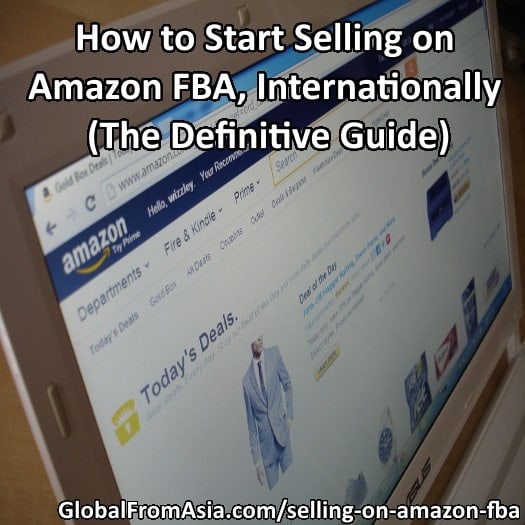
27 Comments on “How to Start Selling on Amazon FBA, Internationally (The Definitive Guide)”
how to buy from a vendor? I have been in contact with a sell(through amazon), he ask have I ordered yet? OK how?
hi David,
a vendor in Amazon – as an end consumer or for wholesale / resell?
Hi there,
I am from Australia and am new to selling on Amazon with the intention of selling in America. So I have got my first product together with logos, suppliers organised etc. but have just hit a slight speed bump with the newly introduced Amazon Brand Registry 2.0. From what I have read I must have my product/brand with an active/registered trademark (USPTO) which I have yet to apply for. I am going to apply for the trademarking ASAP, but I have 2 questions:
1. I only plan to sell in the U.S for the time being so should I just trademark my product in the U.S alone?
2. Is there any other possible ways rather than having to wait it out for the registered trademark for 6 months-year on Amazon? Or should I look at selling my product on Ebay or other avenues until this time period is up?
Look forward to hearing back from you!
HI Dylan,
I asked some others and they said this:
He can sell on Amazon without registered trade mark, but he won’t have the brand registry benefits @michelini Your friend does not need brand registry or a trademark to sell on Amazon US. Just an account with Amazon US to sell. Brand Registry can wait. In the meantime get tm registration going.
Pingback: Is Hong Kong Right For Your Amazon FBA Business?
Want to ask is there any benefit to have a ‘Prime’ account in Amazon? Thanks
Hii how can i find seller central site for different countries….
i liked your wrighting
hi i am anirban from bangladesh account create I want to send my own product to Amazon in my own country and send it to Amazon in my
country, I will do it only to learn business, so that I can start my business with a small amount of money, I want your cooperation.
Hi there,
Do i need to do business registration with HK government to start selling on Amazon professionally? and do i need to create a business account with the bank here in HK through which i process all my transaction with any party involved? or could i just start selling on amazon with my personal name (probably some brand name for the products i’m selling)and with my personal bank account and personal credit card?
Hi there 🙂 !
I admired your article! It’s really well explained, but I still didn’t find an answer to my concern. Can you please help ? My question is: How can we sell stuff with Amazon FBA service from Morocco? Do you have any idea?
Hello,
Thank you for sharing the article. It is very informative.
I am an international seller and have no social security number (SSN) in the US. When I apply for an amazon pro account, will it require me to have EIN number?
Yes, I have been doing Amazon FBA in the UK and US from Ireland for two years.
It is very straight forward to set up but it is also very important that you set up correctly from the start as Amazon doesn’t allow you to change your details easily and they will automatically suspend your seller account if you try to change your details.
I learned from a UK based seller called James Greaney. He is from Ireland but he has been selling on Amazon UK and USA since 2013. He shares lots of helpful tips on his Youtube channel Internetbizuni and I hired him to teach me the process when I first got started.
This is how you can sell on Amazon FBA from Ireland:
Use a UK LTD company.
Send your products to a prep centre in Northern Ireland and from there to Amazon FBA via low cost delivery service UPS.
Make sure to give your correct bank and company details from the start as they are hard to change later.
Do you mind if ask why set up a LTD in the UK? Ireland is an approved country.
Great article
Thanks for sharing. I picked up some gems from it 🙂
Hello there!
This is Alden from Italy, I am an Amazon Account Manager for several companies in Italy. Some of my clients want to expand the sales and start selling in the US. You say that is not necessary a physical presence in the US. But what happen if sales speed up? Do you recommend opening a company, e.g. LLC there? Where can I get some information about this?
Looking forward to your answer.
Best regards
Alden
Amazon FBA is great as it saves time from the seller’s end. It helps sellers to reach more audience while at the same time, giving them more time to work on marketing instead of logistics. Great!
Pingback: What Are The Top Amazon FBA Brokers To Buy/Sell My Business?
hey , thanks for the information , here is a site i found that may help for all the beginners who want to make money online-
hope i helped 🙂
lets become rich!!
any one interested in selling on amazon from anywhere in the world needs a partner to start . I am looking for a partner who has knowledge or has money or has a product or hav them all . Arab gulf country citizens are Welcome. Hopefully we can do some business together .
Please be advised the right partner is crucial to success in Amazon FBA
Hi there, Great article! Thanks for sharing.
I’m quite interested in selling on Amazon FBA but I don’t have a US bank account although I have an HSCB bank account from Hong Kong. Do I still have to open a US bank account or I can use the HK one?
Good Article though one of your feedback on your question was not adequete. The user from Saudi Arabia can sell on Amazon provided that they use an entity based in an approved country. For example if the Saudia Arabian reader sets up company in the United Kingdom or United States, so long as they adhere to British/American laws when it comes to maintaining the company, it is a UK/US based Amazon seller, even though the owner and director of that company may reside in Saudi Arabia.
Of course there are also rules in Saudi Arabia they will have to follow when it comes Controlled Foreign Corporations and as he would be a non-resident of the country his company is based in he would need to file for the proper taxes and tax exemptions in those countries.
Of course a lawyer and/or accountant with expertise in setting up and running a foriegn company would be desirable and nessesary in some cases.
Awesome article. I’d love to dig a bit deeper on the next step for FBA Private Label Sellers: register their brands on Amazon’s USA Brand Registry. Thanks!
This is a great procedure article on how to start selling on Amazon. Very helpful for the ones selling wanting to sell on Amazon. It has got huge advantages and WHY NOT sell on it is not a question but it’s an answer. I mean, why not?! Its Global Selling Program is just killing it in today’s world.
Good job! Thanks for the guide! Would you recommend using next level ninjas? I heard that they could help out a lot!!
our pleasure, have not heard of that firm so cannot comment unfortunately. – Mike
Pingback: How to Triple your Ecommerce Sales By Going International with Tommaso Tamburnotti